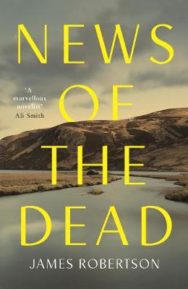‘I don’t think there’s been a summer when so many Scottish writers have brought the past so vividly back to life. ’
David Robinson takes a deep dive into three books that look to the past to offer readers something to enjoy.
News of the Dead
By James Robertson
Published by Hamish Hamilton
Rizzio
By Denise Mina
Published by Polygon
Rose Nicholson
By Andrew Greig
Published by Riverrun
Long before Wolf Hall became the best-selling Man Booker winner of all time – indeed, weeks before it was even published – I interviewed Hilary Mantel about it. Back in 2009, no-one thought of her as the queen of historical fiction, and even if they had done, I doubt whether she would have relished the title, because historical fiction was genre stuff, surely, not really literature?
Well, if there ever was a distinction between the two, Wolf Hall demolished it. I can still remember the thrill of reading it and realising how different it was to anything I’d read. One scene sticks in my mind. In it Henry VIII is wounded, apparently fatally, while jousting, and news of the accident reaches his chief adviser, Thomas Cromwell. He is terrified: no matter how loyally he has served the king, the court seethes with people who resent him. Who is he going to turn to? The wrong choice, and his own head could be on the block within hours.
Deep down, I knew that Henry VIII couldn’t possibly have died while jousting because it was only 1536 and he still had another four and a half wives to go, but such was the clarity of Mantel’s depiction of the scene and the confidence of her writing from within Cromwell’s skull that it excised this knowledge from my own. The king had indeed been seriously wounded – so much so that it altered his whole character – but he was merely unconscious, not dead. Cromwell, taking command of the scene, shouted out the news. ‘“Long live the king!” Thomas bellows (thinking “God save Thomas Cromwell”).’
I mention this scene not just because Mantel, having won the inaugural Walter Scott award for historical fiction in 2010, has won it again this summer for The Mirror & the Light (which I’ve just spent 39 hours listening to as an audiobook), but because for me it sets the standard by which I now judge all historical fiction. Does it make you forget what you know happened next? Does it make the past as fluid and uncertain as the present? Can it drop the reader into the past at the very moment when it hasn’t yet solidified into textbook history, when it is still provisional, squirming with possibility? And if this seems too much to expect, well, hold your historical horses, because I don’t think there’s been a summer when so many Scottish writers have brought the past so vividly back to life.
At this month’s Edinburgh International Book Festival, for example, Denise Mina will unveil her eagerly anticipated novella Rizzio, the first in a new series from Polygon of Darkland Tales, which promises to be “a redux of landmark moments from the past, viewed through a modern lens and alive to modern sensibilities”: books by Jenni Fagan (on the 16th century witch trials in North Berwick) and Alan Warner (on Bonnie Prince Charlie’s flight from Culloden) are promised for next year. Also launched this month is James Robertson’s captivatingly and thought-provoking News of the Dead, which is set in an Angus glen on a chronologically even wider stage, reaching back from the present to an eighth-century Christian hermit via a 19th century antiquarian chancer.
Mina and Robertson have wildly different, but no less effective, ways of writing about the past. In Rizzio, Mina uses an urgent present tense, with a keen eye for oddity and detail to tell the story of the murder of Mary Queen of Scots’ Italian secretary. The lead conspirator Ruthven, for example, “is wearing a bed shirt tucked messily into a bizarre suit of mismatched armour, with a snapped leather buckle at the side of the breast plate so it flaps about”. The assassins queue up to stab Rizzio “and, having done their duty, they step back, make eye contact with other men. Sometimes they smile at each other reflexively as they move away, as if they’re giving way at a urinal”. These, she implies, are the “great men of history”, whose efforts here are undone by a queen faking a miscarriage “and a dumpy widow-woman carrying a piss pot”. A feminist rage burns fiercely throughout, at everything from Darnley’s mauling of his wife’s pregnant belly to his presumption that she has no power without him.
Robertson’s novel is a much slower burn, but still deeply satisfying. His fiction has often explored the past to great purpose, as in his magnificent The Land Lay Still, about the making of modern Scotland, or the slavery-themed Joseph Knight. Here, though, the focus is on nothing less than on the nature of history itself: its gaps, deliberate myths, accidental lies and time-honoured fictions. While Rizzio is all flashing blades and double crosses, in News of the Dead whole weeks go by in which a mildly dodgy scholar employed by a slightly eccentric laird does little more than go about his business of translating a medieval document about an eight century local holy man. By the end of the novel, though, all these threads through time weave together in a profoundly moving way: think of the end of Middlemarch, transpose it to an Angus glen, and you won’t be too far wrong. Judge for yourself at the end of the month, when it is Radio 4’s Book of the Week.
Finally, back to the Reformation. Rose Nicholson, Andrew Greig’s new novel, opens in Edinburgh in 1574. The Queen’s men hold the Castle, the King’s men (strictly speaking, the Regent’s) are in the Canongate, bringing up cannon for a siege. Right in the middle is William Fowler, 14-year-old son of a Protestant moneylender and his Catholic wife. If you know your Scottish literature, you’ll already know Fowler’s career ends astonishingly well for a poet - the king gives him 2,000 acres of Ulster, the queen makes him her private secretary, although both of these were probably rewards for his effectiveness as a courtier/diplomat as for his poetry. But that’s the at-a-glance retrospective précis of his life – everything that a good writer of historical fiction wants to avoid – which is why, apart from occasional quotes from Fowler’s verse, Greig makes no mention of his protagonist’s glittering future career.
The past, we are forever told, is a different country: but sometimes it’s a country without any kind of certainty about what kind of place it is (just like the UK right now, come to think of it). In 1574, Scotland is taking back control of religion, banishing the European mode of worship, but the Great Religious Breakaway is not yet complete. (If you’ve spotted any underlying parallels with Brexit in this welter of Reformation fiction, you’re not alone: PhD theses have been written about less). Greig’s young protagonist, off to university at St Andrews, knows full well the dangers of saying the wrong thing when asked about his religion (“the most personal and dangerous question of the times”). Tread on a scorch-marked pavement site of a Protestant martyr’s immolation, rather than respectfully step around it, and a red-gowned student like him risks being beaten up – or worse.
Catholicism hasn’t, however, been completely banished: people like Will’s mother still attend clandestine masses. Mary, Queen of Scots has stayed loyal to the Old Religion and although she has abdicated the Scottish throne, stands a chance of taking over the English one. Meanwhile, Esme Stuart, James VI’s mentor, makes no bones about being a Catholic, and may even be plotting a Counter-Reformation. Scotland looks like being Protestant, but what kind of Protestant: Puritan or humanist? And could it not just as easily be Catholic, English (like the 1574 troops pulling the cannon to lay siege to the Castle) French (like the Queen) or (a bit of a push, this) British?
There’s a lot to enjoy in Greig’s novel (Romance! Witchcraft! Golf! Theology! Reivers! High politics! Assassinations!) but for me none of it would work if it hadn’t already passed what I shall call the Hilary Mantel Uncertainty Test. It’s quite simple. Does the book make the past feel as alive and uncertain as the present? Remarkably – and wonderfully – all three of this crop of Scottish novels do just that.
Rose Nicholson: A Novel, by Andrew Greig is published by river run, price £18.99
Rizzio, by Denise Mina, is published next month by Polygon, price £10
News of the Dead, by James Robertson, is published by Hamish Hamilton, price £18.99
ALSO IN THIS ISSUE

 The Darlings: An interview with Angela Jackson
The Darlings: An interview with Angela Jackson
‘I wanted to explore what [accidentally killing someone] might do to someone.’
















